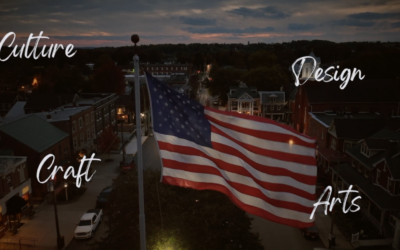In September of 2022, President Biden announced his reinstatement of the President’s Committee on the Arts and the Humanities (PCAH), an advisory committee focused on cultural issues, led by Executive Director Tsione Wolde-Michael, formerly the Director of the Center for Restorative History and Curator of African American Social Justice History at the Smithsonian Institution.
The President went on to announce further appointments to the Committee on April 13, 2023, with a raft of both public and private members from all corners of American arts and culture. President Biden appointed as co-chairs singer/songwriter Lady Gaga (who had previously partnered with Biden in 2017 for the “It’s On Us” campaign against sexual assault); and Oscar and Tony-winning, Emmy-nominated producer of theater, film, TV, and more, Bruce Cohen (whose production of Jeremy O. Harris’ “Slave Play” holds the record for Tony award nominations for a play in a single year).

President Biden’s announcements have come as welcome relief to the arts and culture sector, which has been largely shut out of federal conversations since 2017, when the PCAH was the first official White House agency whose members resigned en masse from the Trump administration, sparked by former President Trump’s remarks regarding the violent clash between protestors and white supremacists in Charlottesville, Virginia.
The reinstitution of the Committee and its subsequent appointments reflect a long history of federal engagement with the arts and culture scene. The Committee itself dates back to its creation in 1982 under Ronald Reagan, but previous Presidents on both sides of the aisle have expressed support for national arts and humanities programs for nearly a century.
America's Tradition of Artistic Support
From FDR’s Federal Project Number One, a relief program for Depression-era artists, musicians, and writers, for which an estimated $27 million was allocated in 1935 (nearly $600 million in today’s funds); to Truman’s Marshall Plan, which spread American culture across the globe to combat the rise of authoritarian regimes abroad; to JFK’s 1962 establishment of the first Special Consultant on the Arts, August Heckscher, who encapsulated the symbiotic relationship between the arts and public policy: “Government must and does realize that we must build by calling on our finest geniuses. From a postage stamp to national roadways…government should plan with aesthetic consideration in mind.”
Government must and does realize that we must build by calling on our finest geniuses. From a postage stamp to national roadways…government should plan with aesthetic consideration in mind.
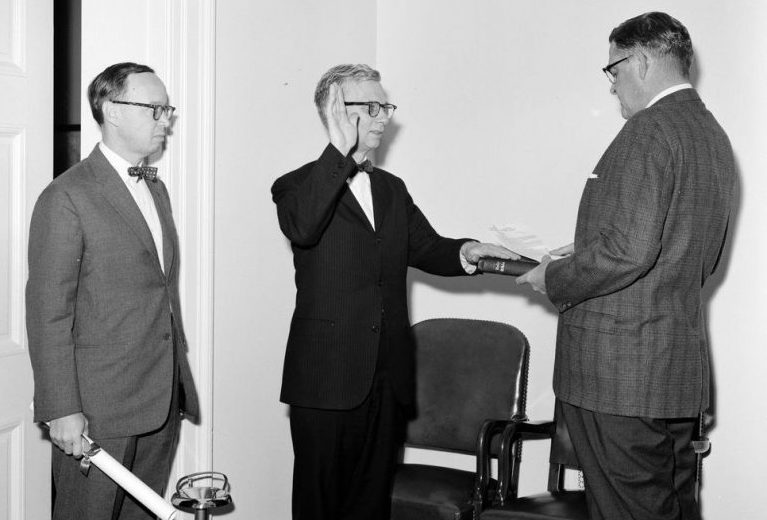
But America is Artistically Absent
And yet, despite this history and its legacy of culture that has reached around the globe, the United States remains one of the few countries in the world with no dedicated role in the federal government devoted to the development, maintenance, and promotion of its national arts and culture scene.
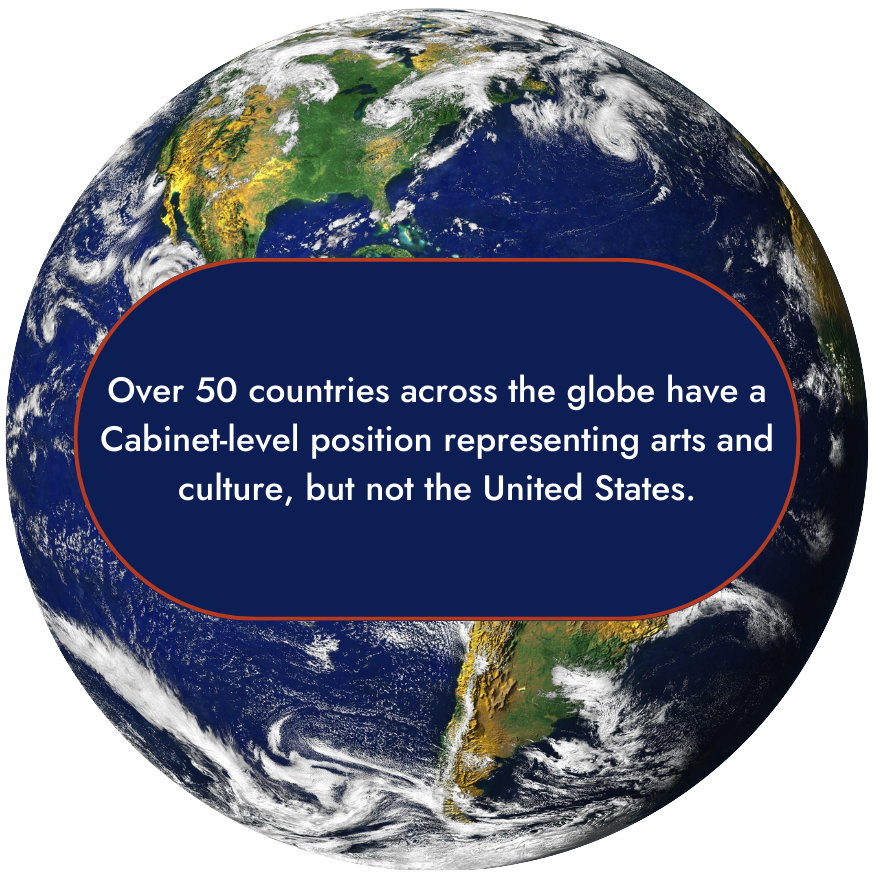
Over 50 countries across the globe, including all our major peers and competitors, feature a Cabinet-level position such as Minister or Secretary of Arts and Culture, from Albania to Zimbabwe. The United Kingdom, France, Japan, Argentina, Russia, China, Australia, Saudi Arabia, Türkiye, and Ukraine all feature federal representatives for national arts, culture, and heritage, dedicated to promoting their country’s values and way of life, but the United States of America does not.
(But some institutions are taking matters into their own hands. The University of Texas in Austin appointed Matthew McConaughey as its own Minister of Culture in 2019.)
America's Place in Cultural History

This is all the more surprising when we think back to the United States’ formative role in the United Nations, including the very active role of Eleanor Roosevelt. Roosevelt act as U.N. delegate and first chairperson of the Commission on Human Rights in codifying the Universal Declaration of Human Rights, which enshrines the right to arts and culture into law.
However, despite hailing itself as the “land of the free,” the U.S. remains one of four countries (along with Comoros, Cuba, and Palau) that failed to ratify The United Nations International Covenant on Economic, Social and Cultural Rights, making the Declaration legally binding. All 171 other United Nations members ratified the covenant, holding themselves accountable on the world stage for upholding their citizens’ right “freely to participate in the cultural life of the community, to enjoy the arts and to share in scientific advancement and its benefits” (Article 27:1).
And So Much More...
And of course, the arts and humanities don’t just bring intrinsic benefits to American citizens. Arts and culture as an industry contributed over $1 trillion to the U.S. economy in 2021, second only to retail. It adds more to our GDP than construction or transportation, and contributes almost twice as much as agriculture and mining combined. Yet while transportation, agriculture, energy, technology, and education all hold seats in the Presidential Cabinet, the powerhouse economic driver that is arts and culture does not.
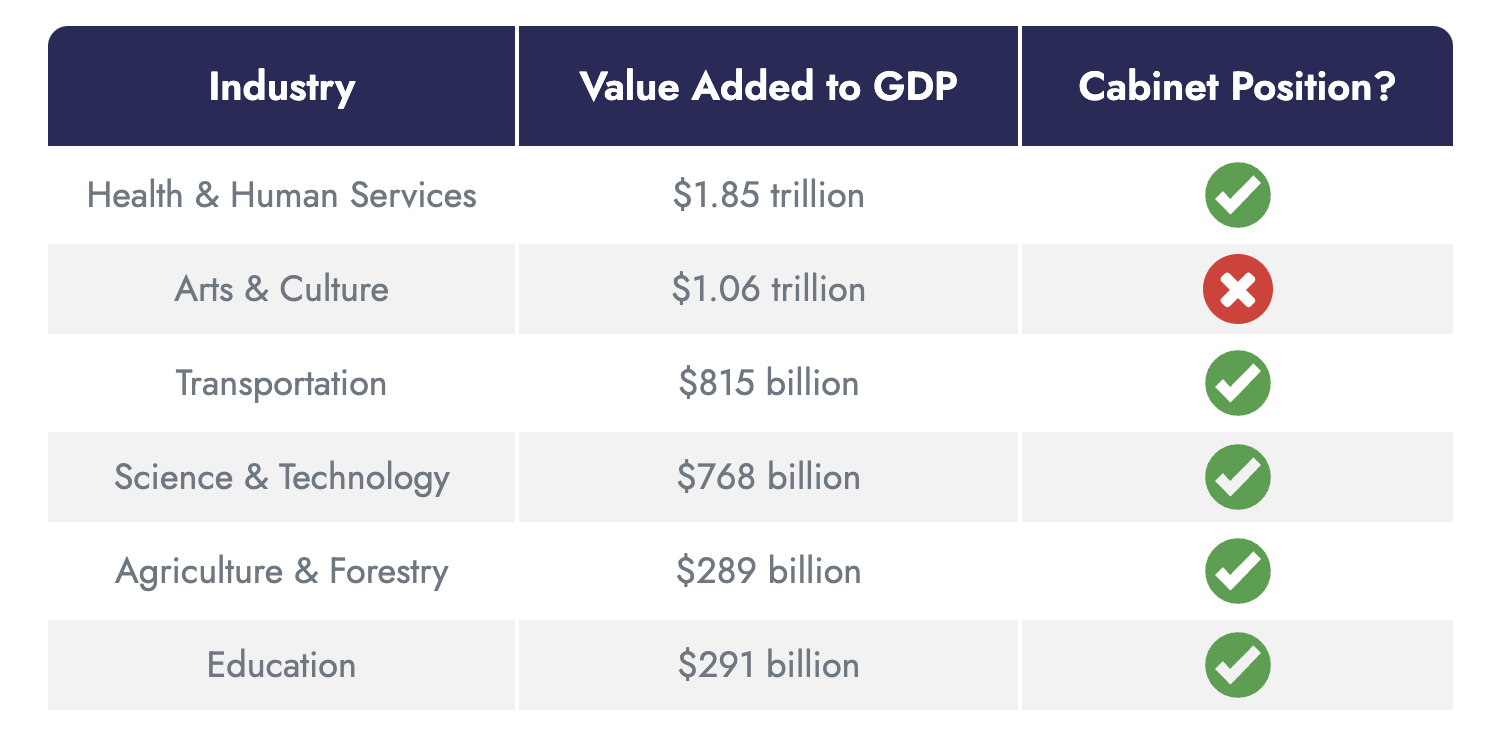
Omitting arts and culture from the legislative table not only denies America’s fourth-largest industry employer representation at the federal level, but disallows the immense benefits such representation would bring to the entire country. Research shows that arts and culture foster stability and peace in societies, and no one can deny that the U.S. needs a hefty dose of peace and unity at this juncture. Economically speaking, in the United Kingdom, for every £1 of U.K. taxpayer money that funded its national Arts Council, the arts and culture industry returned £5 to taxpayers. Imagine the increase in our national coffers should our federal government decide to invest in an industry the size of arts and culture.
For every £1 of United Kingdom taxpayer money that funded its national Arts Council, the arts and culture industry returned £5 to taxpayers.
America Needs to Step Up - At Home and Abroad
And it’s not just at home where the arts investment pays off. America has struggled to maintain its position as global leader in a number of ways over the past decade, but nowhere is that more evident than in cultural measurements. While the U.S. held the top spot for global soft power in 2016, it tumbled year-over-year to the sixth spot in 2020, concurrent with the Trump administration’s persistent devaluation of the arts and its role in international diplomacy.
But appointing a Secretary of Arts could help, and there has already been broad support for the idea from the American public. In 2009, superstar record producer Quincy Jones started a petition to create a Secretary of Arts & Culture that garnered over 239,000 signatures, later speaking to NPR about his belief that “artists helped to define a society and that having a secretary of the Arts would send the message that America values its culture.” “I have traveled all over the world all the time for 54 years. The people abroad know more about our culture than we do,” Jones said.
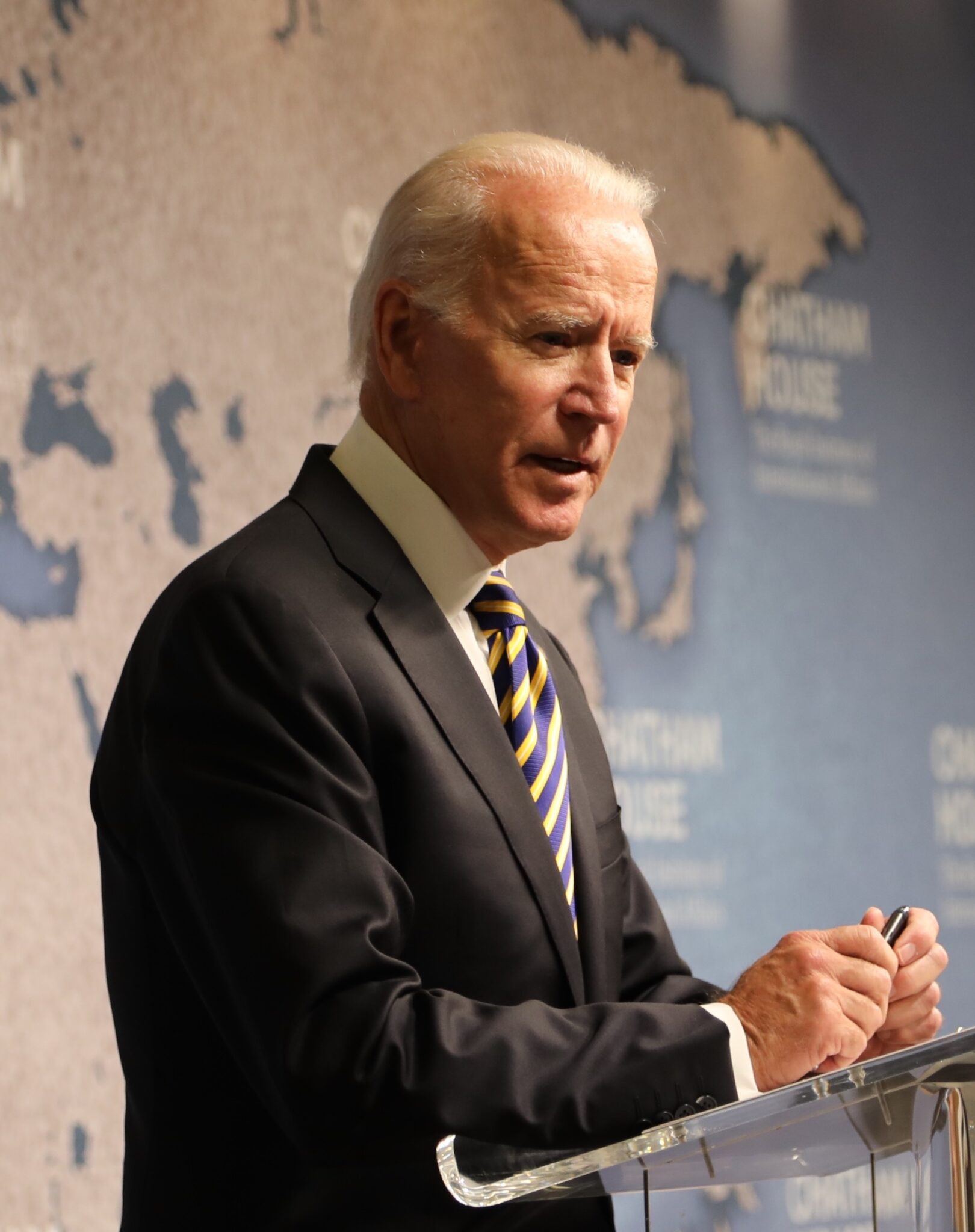
President Biden has not only historically demonstrated support for the arts via his voting record and his backing of initiatives such as co-sponsoring the bills that authorized the Smithsonian’s National Museum of African American History and Culture and established the American Folklife Center at the Library of Congress.
He has also repeatedly exhibited a personal respect for and understanding of the ways that arts and culture can guide the future of a nation. Biden frequently refers to and quotes his favorite poem, Seamus Heaney’s “The Cure at Troy,” both at home and abroad: “But then, once in a lifetime / The longed-for tidal wave / Of justice can rise up, / And hope and history rhyme,” Heaney says.
A Good First Step
The reestablishment of and appointments to the PCAH are an important step towards making “hope and history rhyme.” If the U.S. is to restore itself to its position as a leader of democracy, freedom, and cultural excellence, it must step into that role in a formal, dedicated way. The right to arts and culture is a well-established and chartered legal right around the globe, and yet Americans have never enjoyed that right, despite the immense benefits that investment in the arts can bring to us all.
It’s time to take the next step towards truly making America “the land of the free, and the home of the brave.” Creating the role of a Secretary of Arts and Culture and securing their place within the Presidential Cabinet, a place commensurate with the immense current and future value the arts industry brings to that table, is essential for America to live up to its full potential as the standard-bearer of democracy and freedom around the globe.
President Biden has already appointed one brand-new Cabinet position in 2020 – the first ever Director of the Office of Science and Technology Policy, and in his announcement for his 2024 re-election campaign, declared his commitment to “more freedom” and “more rights.” At 4A Arts, we believe it’s now time for him to do so for the second-largest industry in the country. Appointing a Secretary of Arts and Culture will pave the way for America to “finish the job.”
(This post was edited July 11, 2024 to update dates.)






